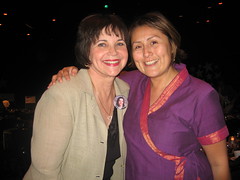I used to do website critiques fairly regularly, and fantastic web designer Kathleen MacIver gave wonderful in-depth critiques to our participants. We’ve fallen out of touch (but Kathleen, if you’re reading this, I’d love to change that!), but a lot of her wisdom from previous critiques is just as applicable to our victims volunteers from this round!
On defining your site through blog goals:
Is [your blog] primarily for you, as a method of self-expression? If so, then who cares what it looks like!
The fact that you asked for this review, however, makes me think that you ARE hoping this blog achieves something. It doesn’t appear that you’re trying to promote your own writing, since a skim down through the posts showed me nothing along those lines. Are you trying to build a small community? Just meet people online? Right now this blog is a pretty clear reflection of you, as a person, and your love of words. It’s not a reflection of your stories or books or poems, or of a particular genre. Do you want it to be?I’m not really sure what to suggest, since I don’t know what that goal is. But think about it. This is where every website should start . . . with a careful assessment of what the goal of the website (or blog) is, what you hope it will achieve, and who you hope to reach with it. Everything else needs to follow that.
On matching your design to your theme, and the purpose of design:
A website made from a basic, generic template (99% of the time) is like finding a hardcover book that’s missing its dust jacket (the old kind that had nothing more than a solid color and gold lettering on the edge). There’s nothing to turn you off to the book/site, but you really had to have a compelling reason from somewhere else in the universe to open up that book and start reading, because the book cover itself is offering you nothing.
You do have that little paragraph that explains a little. Now you need to find a design that is the visual interpretation of your concept. . . .
Basic layouts for blogs are often best, since people are there to read content (once they know they’re interested, of course).
So all-in-all . . . you don’t have anything wrong here, but you haven’t really taken any steps toward the two main goals of a website’s design, which are:
- Instantly portray what your website is about, and what the visitor will receive if they hang around. (In your case, interesting information that they’re not likely to find anywhere else on the Internet, since the number of brain scientists blogging about writing has got to be extremely small)
- Make the site stick in their mind, thereby upping their chances of wanting to come back, coming back, and remembering why they bookmarked it when they do come back.
And this one is actually from me, on the purpose of a website:
Also, make your website somewhere that people will want to come back to—do something for them, reach out to them (see building a community), be accessible. Even if they’ve already bought your book, they’re still your customers, your readers, your fans, and striving to build a relationship with them (individually and collectively) can help sustain you, both emotionally and financially. . . .
Always remember: your website will be the major way you’ll interact with most of your readers and potential business associates. Use it wisely!
 I’d forgotten how much good advice has already passed through here, and I know many readers weren’t here two years ago when we were doing these. Luckily, I’ve already collected the generally-applicable advice from several of the critiques and put them together into a handy, free PDF: a Guide to Aspiring Author Websites!
I’d forgotten how much good advice has already passed through here, and I know many readers weren’t here two years ago when we were doing these. Luckily, I’ve already collected the generally-applicable advice from several of the critiques and put them together into a handy, free PDF: a Guide to Aspiring Author Websites!
What do you think? What did you take away from these critiques that will help with your site?
Photo credits: heart in a book—Piotr Bizior; book without cover—Marcos Ojeda






 )
)
 Your search engine presence (searching for [Cindy R. Williams]) isn’t bad, especially considering you’re facing some pretty serious competition from this Cindy Williams. (She’s Cindy Williams, but Shirley of Laverne & Shirley has at least a little bit of info about her on the web.)
Your search engine presence (searching for [Cindy R. Williams]) isn’t bad, especially considering you’re facing some pretty serious competition from this Cindy Williams. (She’s Cindy Williams, but Shirley of Laverne & Shirley has at least a little bit of info about her on the web.) 
 Unless you’re trying not to overly emphasize a nonfiction or an e-credit, I think you should highlight your publishing credits a little more—for example, on your home page, you could put that above the progress on your latest work. (It’s always good to know that you’re working on something, but a credit is going to be more impressive to potential editors and agents.) You could also promote your book better to help push more sales—a purchase link would be helpful there.
Unless you’re trying not to overly emphasize a nonfiction or an e-credit, I think you should highlight your publishing credits a little more—for example, on your home page, you could put that above the progress on your latest work. (It’s always good to know that you’re working on something, but a credit is going to be more impressive to potential editors and agents.) You could also promote your book better to help push more sales—a purchase link would be helpful there.

 competition for your name, and Bing can’t find you at all (not terribly surprising). Google ranks your site as #5 and your blog as 8 (your Twitter profile is between those). Yahoo ranks your blog as #1 and your site at the 8th and 9th positions.
competition for your name, and Bing can’t find you at all (not terribly surprising). Google ranks your site as #5 and your blog as 8 (your Twitter profile is between those). Yahoo ranks your blog as #1 and your site at the 8th and 9th positions.